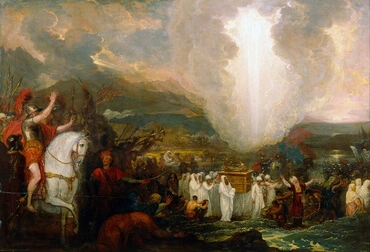1
Und dies ist es, was die Kinder Israel als Erbe im Lande Kanaan erhielten, was ihnen Eleasar, der Priester, und Josua, der Sohn Nuns, und die Häupter der Väter (d. h. Stamm- oder Familienhäupter; so auch Kap. 21,1 usw.) der Stämme der Kinder Israel ihnen als Erbe austeilten,
2
durch das Los ihres Erbteils; so wie Jehova durch Mose geboten hatte betreffs der neun Stämme und des halben Stammes.
3
Denn das Erbteil der zwei Stämme und des halben Stammes hatte Mose jenseit des Jordan gegeben; den Leviten aber hatte er kein Erbteil in ihrer Mitte gegeben.
4
Denn die Söhne Josephs bildeten zwei Stämme, Manasse und Ephraim; und man gab den Leviten kein Teil im Lande, außer Städten zum Wohnen und deren Bezirken für ihr Vieh und für ihre Habe.
5
So wie Jehova dem Mose geboten hatte, also taten die Kinder Israel, und sie teilten das Land.
6
Und die Kinder Juda traten in Gilgal zu Josua; und Kaleb, der Sohn Jephunnes, der Kenisiter, sprach zu ihm: Du kennst das Wort, welches Jehova zu Mose, dem Manne Gottes, meinet- und deinetwegen in Kades-Barnea geredet hat.
7
Vierzig Jahre war ich alt, als Mose, der Knecht Jehovas, mich von Kades-Barnea aussandte, um das Land auszukundschaften; und ich brachte ihm Antwort, wie es mir ums Herz war.
8
Und meine Brüder, die mit mir hinaufgezogen waren, machten das Herz des Volkes verzagt; ich aber bin Jehova, meinem Gott, völlig nachgefolgt.
9
Da schwur Mose an selbigem Tage und sprach: Wenn nicht das Land, auf welches dein Fuß getreten ist, dir und deinen Söhnen zum Erbteil wird ewiglich! denn du bist Jehova, meinem Gott, völlig nachgefolgt.
10
Und nun siehe, Jehova hat mich am Leben erhalten, so wie er geredet hat, diese 45 Jahre, seitdem Jehova dieses Wort zu Mose geredet hat, als Israel in der Wüste umherwanderte; und nun siehe, ich bin heute 85 Jahre alt.
11
Ich bin heute noch so stark wie an dem Tage, da Mose mich aussandte; wie meine Kraft damals, so ist meine Kraft jetzt zum Streite und um aus- und einzuziehen.
12
Und nun gib mir dieses Gebirge, von welchem Jehova an jenem Tage geredet hat; denn du hast an jenem Tage gehört, daß die Enakim daselbst sind und große, feste Städte. Vielleicht ist Jehova mit mir, daß ich sie austreibe, so wie Jehova geredet hat.
13
Und Josua segnete ihn und gab dem Kaleb, dem Sohne Jephunnes, Hebron zum Erbteil.
14
Daher ward Hebron dem Kaleb, dem Sohne Jephunnes, dem Kenisiter, zum Erbteil bis auf diesen Tag, weil er Jehova, dem Gott Israels, völlig nachgefolgt war.
15
Der Name Hebrons war aber vordem: Stadt Arbas; (H. Kirjath-Arba; vergl. 1. Mose 23,2;35,27) er war der größte Mann unter den Enakim. -Und das Land hatte
uhe vom Kriege.







